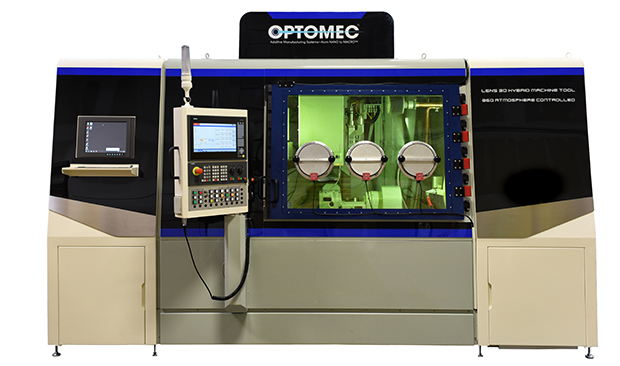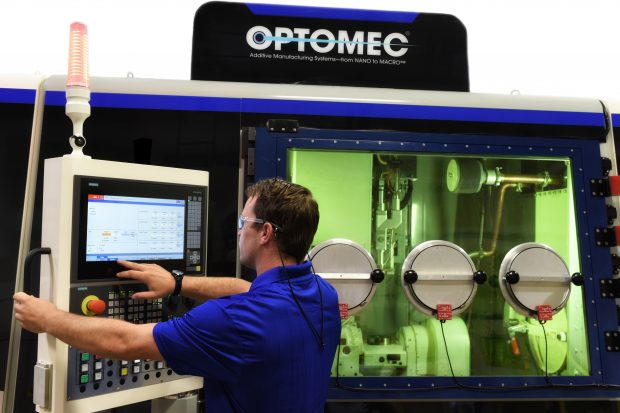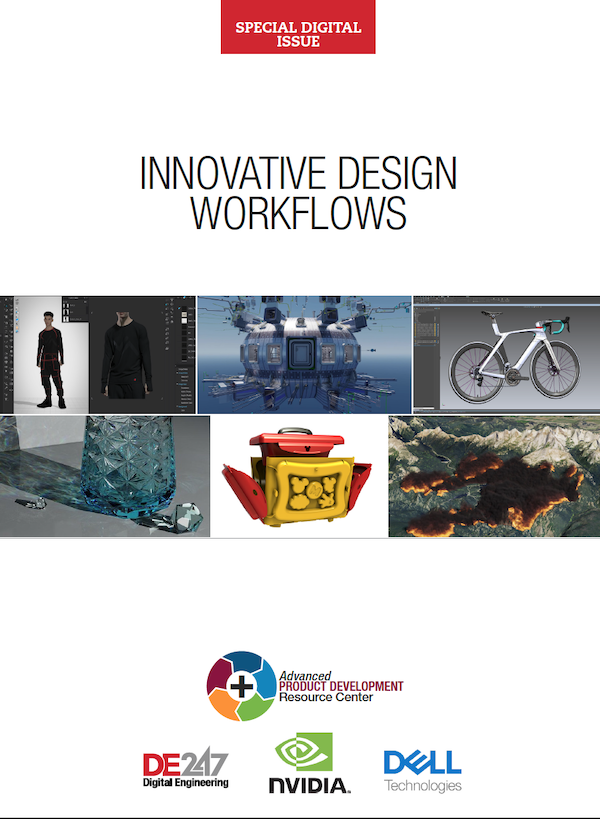Optomec’s LENS Hybrid System Put to Work for Medical Applications

The LENS 860 Hybrid Controlled Atmosphere System from Optomec, with a larger work envelope and higher powered lasers, provides more capabilities for metal hybrid additive manufacturing. Image courtesy of Optomec.
Latest News
September 14, 2018
Optomec, supplier of production-grade additive manufacturing (AM) systems for 3D printed metals, shared details of how the University of Nebraska-Lincoln (UNL) is using an Optomec LENS hybrid-controlled atmosphere system to develop dissolvable magnesium components that have potential for great implications in the design and manufacture of next-generation medical implants. This work will enable 3D printed, patient-specific implants with controlled time to dissolve the need for second surgeries and thus also reducing risks, costs and suffering for patients, the company reports.
 The LENS 860 Hybrid CA system is equipped with a hermetically-sealed build chamber that maintains oxygen and moisture levels below 40 ppm for processing reactive metals, such as Titanium. Image courtesy of Optomec.
The LENS 860 Hybrid CA system is equipped with a hermetically-sealed build chamber that maintains oxygen and moisture levels below 40 ppm for processing reactive metals, such as Titanium. Image courtesy of Optomec.“Our research is focused on advancing the performance and functionality of dissolvable devices,” says Dr. Michael Sealy, assistant professor, Mechanical and Materials Engineering at UNL and a pioneer in advanced manufacturing research. “Using LENS, we are applying a hybrid additive manufacturing process to control the disintegration of medical fasteners and plates so they stay in-tact long enough to serve their purpose and then degrade away once the bone is healed.”
Currently, medical implants, such as plates and screws, are made of titanium or stainless steel, which are permanent structures that often have high complication rates and require a second surgery for removal. By using the LENS Hybrid Controlled Atmosphere System to print patient-specific magnesium implants with a controlled time to dissolve, Dr. Sealy’s team is helping eliminate the need for second surgeries and thus also reducing risks, costs and suffering for patients.
“Two years ago, at IMTS in 2016, Dr. Sealy and his team at University of Nebraska became the first customer of our LENS Hybrid Controlled Atmosphere system,” says Tom Cobbs, LENS product manager at Optomec. “Dr. Sealy’s pioneering work enables the design and manufacture of components with a combination of properties unobtainable using traditional metal working methods.”
Powdered metals such as magnesium, titanium and other reactive materials must be processed in a controlled atmosphere environment where oxygen and moisture impurities are maintained below 10 parts per million. Dr. Sealy used the Optomec LENS 3D Hybrid Controlled Atmosphere System to process these materials in a way that addresses a key scientific challenge: how to maintain the strength and integrity of a degradable implant long enough for it to do its job.
 The LENS 860 Hybrid Controlled Atmosphere System from Optomec, with a larger work envelope and higher powered lasers, provides more capabilities for metal hybrid additive manufacturing. Image courtesy of Optomec.
The LENS 860 Hybrid Controlled Atmosphere System from Optomec, with a larger work envelope and higher powered lasers, provides more capabilities for metal hybrid additive manufacturing. Image courtesy of Optomec.The LENS Hybrid CA System enables Sealy and his team to couple LENS deposition technology with layered surface treatments to print 3D metal components in magnesium with controlled degradation.
The University of Nebraska-Lincoln recently established the Nebraska Engineering Additive Technology (NEAT) Labs to create a regional hub for additive manufacturing research and innovation that enables collaborations among academia and industry.
The Optomec LENS 3D Hybrid Controlled Atmosphere System is an atmosphere-controlled system for additive and subtractive processing of metals, including titanium and aluminum. Optomec LENS hybrid technology combines a rugged computer numerical control automation platform with LENS technology.
For more info, visit Optomec.
Sources: Press materials received from the company.
Subscribe to our FREE magazine, FREE email newsletters or both!
Latest News
About the Author
DE’s editors contribute news and new product announcements to Digital Engineering.
Press releases may be sent to them via [email protected].






